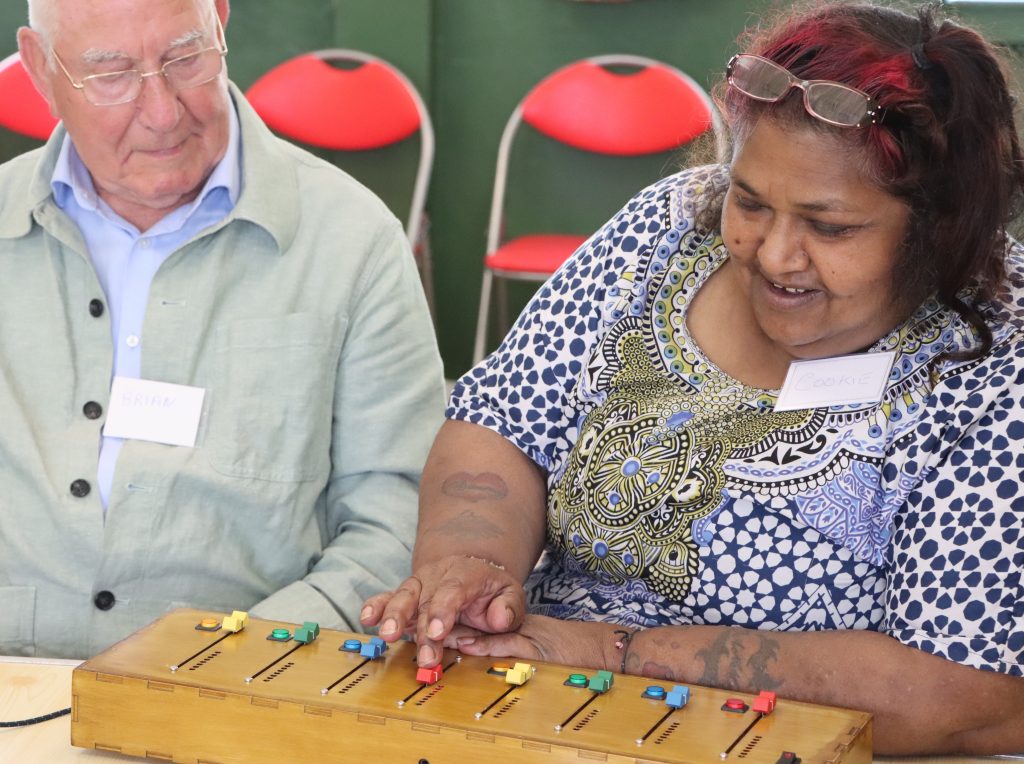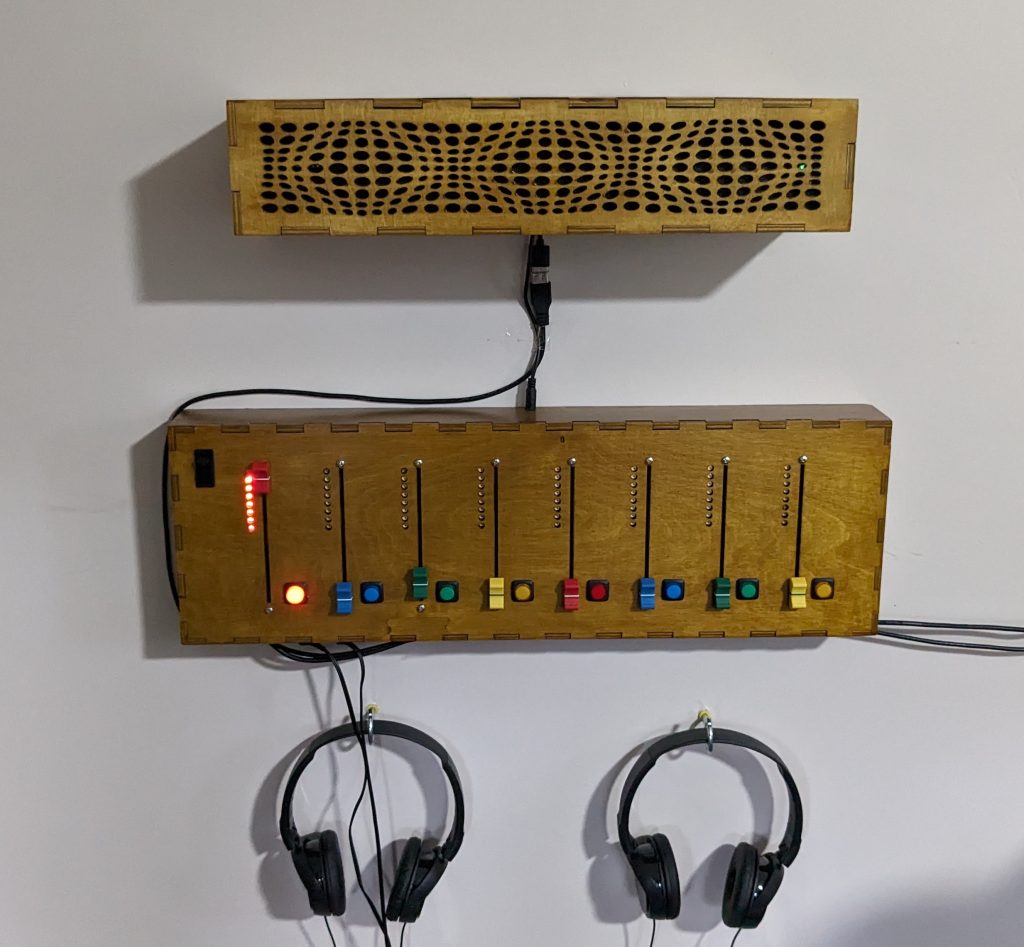Audio playgrounds: tools for listening or music creation
Pigrem J (2024) Audio playgrounds: tools for listening or music creation. Journal of Dementia Care 32(6)10-11.
Jon Pigrem describes how the Music Dementia Technology team at the University of Sheffield has worked closely with community groups and care settings to develop an innovative device for music-based activities and therapies
Author Details
Jon Pigrem is a research technician in the Music Dementia Technology team at the University of Sheffield.
Key points
- The Sliderbox is an accessible device for music-based activities and therapies.
- Designed with those living with dementia and their care team. It currently runs in a jukebox mode (Listening Post) or a creative music-making mode (Audio Playground).
- Carefully designed technology makes interacting with music more accessible around the clock for both those living with dementia, and those who provide care.
- The Audio Playgrounds have the ability to provide agency though creativity and musical interaction.
Sustained engagement with music has been shown to aid vital aspects of life for those living with dementia, such as the sense of self (Baird & Thompson 2018), an awareness of the moment and memories of the past (Dowlen et al 2022, Elliot et al 2020). In the Music Dementia Technology team at the University of Sheffield we explore the potential for musical technology to support and develop these aspects (and more) through the careful implementation of technological solutions. We work with a range of stakeholders, ensuring we include the voices of those living with dementia, their families and their carers in our participatory activities.
Working closely with community groups and residential care settings in Sheffield and beyond enables us to explore the needs and wants of these groups, and the common issues encountered in the facilitation of music-based activities and therapies. To date we have conducted over 50 visits and worked with over 500 participants, providing a range of music-based activities using technology. We develop technological solutions to use in our research, and have the ability to test and improve them, and the theories which inform them, through real life experience and practical deployment.
What does music technology add?
There is lots of great work and research happening currently which explores the roles of music and arts-based activities for those living with dementia (MacRitchie et al 2023) – from dementia choirs and singing groups to songwriting groups and music workshops. Through our own work we have been fortunate enough to explore the potential for musical interventions, as well as experiencing first hand some of the limitations and bottlenecks in its facilitation. We work with care settings and music facilitators to find the right place where technology might best have added value.
Through our work we aim to:
- make music technology more approachable
- provide consistent opportunities for music interaction around the clock
- increase the potential for agency for those living with dementia.
The Sliderbox

The Sliderbox is an accessible music device which facilitates a range of musical experiences for its users. Designed for use with and by those living with dementia the device removes the complexities often found with music technologies, providing mature and stimulating musical interactions and round the clock accessibility.
Physically the device invites interaction through the use of robust natural materials, polished surfaces, chunky physical controls, and clear visual feedback. We enable the use of tactile knowledge that often lasts well in dementia and borrow from lived choreographies (like turning a door handle or a key in a lock) which continue to inform expectations and interactions at all stages of life. This approach addresses many of the challenges posed by common technologies and enhances the potential for autonomy in use (Pigrem et al 2023).


Audio Playgrounds
The Audio Playgrounds are a ‘choose your own adventure’ in sound. Users create their own unique piece of music by exploring, selecting and combining carefully created musical material. Each Audio Playground explores a different mood and feel, from classical to soundscapes, with varying levels of complexity to suit users at all stages of their dementia. Research shows that creativity provides vital opportunities for agency, and through intentional creative actions users can become active agents in their own creative flourishing.
The Listening Post
In ‘Listening Post’ mode the Sliderbox works as a jukebox, capable of holding up to eight different musical playlists of the user’s choice. The device provides potential for customised audio content such as soundscapes, unique stories, messages from loved ones, and home specific content.
The Sliderbox in use
We have been using the Sliderbox in our work for around two years and testing the Audio Playgrounds for just over a year. Over time this has developed and expanded into a suite of compositions, with varying levels of challenge for users. In a recent study (Pigrem et al 2024) we evidenced positive engagement levels with a mixed group of participants who joined us to explore the Audio Playgrounds. For most users, we were able to detect a pattern of interaction which we believe demonstrates agency embedded in creative decision making.

In partnership with residential care settings, we are seeing positive outcomes from deployments of the Sliderbox in both its Listening Post and Audio Playground modes. Here is what our partners say:
“My observations of residents using the Sliderbox [in audio playground mode] have highlighted changes in perception, processing and understanding and the level of autonomy and coping strategies. It has also encouraged space sharing and interaction stimulating interest, choice making and adaptive techniques that have visibly enhanced feelings of empowerment and has offered a unique and valuable insight into their lived experience.“
Fiona Pritchard – Music and Arts Partner, Colten Care
“The Listening post gave the residents the opportunity to be involved in development of a useable item that can be used at Sheffcare and in other settings. It gives the care home a tool that can be used for entertainment and engagement. It also gives residents a simple device that enables them to make choices and select difference tunes themselves.”
Kathryn Rawling – Dementia and Wellbeing Manager, Sheffcare
Acknowledgements
We would like to thank the wider MDT team (Dr Justin Christensen, Prof. Renee Timmers, Prof Luc de Witte, Prof. Andrew MacPherson) and our partners in community and residential care for their contributions to this work and our wider research. Our research is funded by a UKRI Future Leaders Fellowship.
If you would like to know more about our work and research, feel free to get in touch via our website: https://tinyurl.com/2kwr49d3, or contact
Jennifer MacRitchie (j.macritchie@sheffield.ac.uk)
or Jon Pigrem (j.m.pigrem@sheffield.ac.uk).

References
Baird A, Thompson WF (2018) The impact of music on the self in dementia. Journal of Alzheimer’s Disease 61(3):827–841.
Dowlen R, Keady J, Milligan C, Swarbrick C, Ponsillo N, Geddes L, Riley B (2022) In the moment with music: An exploration of the embodied and sensory experiences of people living with dementia during improvised music-making. Ageing & Society 42(11):2642–2664.
Elliott M, Gardner P, Narushima M, McCleary L (2020) Music lessons: Exploring the role and meaning of music for older adults with dementia. Canadian Journal on Aging/La Revue canadienne du vieillissement 39(4):586–599.
MacRitchie J, Floridou GA, Christensen J, Timmers R, de Witte L (2023) The use of technology for arts-based activities in older adults living with mild cognitive impairment or dementia: A scoping review. Dementia 22(1):252–280.
Pigrem J, MacRitchie J, McPherson A (2023) Instructions not included: dementia-friendly approaches to dmi design. In Proceedings of the International Conference on New Interfaces for Musical Expression. New Interfaces for Musical Expression.
Pigrem J, MacRitchie J, McPherson A (2024) Agency and Creativity in Musical Interaction for those living with dementia and cognitive decline. In Proceedings of the International Conference on New Interfaces for Musical Expression. New Interfaces for Musical Expression.
